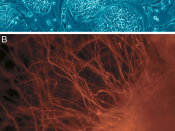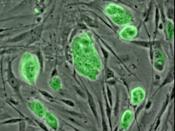Embryonic Stem Cell Research: The controversy over whether it's right or wrong.
Stem cell research brings forth many new and exciting ways of looking at science. "A lot of advancements have been made and our society has been greatly impacted by them (Mitus)." Aside from all of the positive outlooks in this field of science, stem cell research has many ethical controversies, while also having some scientific problems. Stem cells are undifferentiated cells that have the ability to differentiate into many different cell types and also the capability of self-renewal (Huff). There are a few ways to retrieve stem cells from humans. There are adult somatic stem cells, umbilical cord stem cells and embryonic stem cells. Some people think that embryonic stem cell research is unethical because they believe that the embryo is a baby; others think the few day old embryo isn't a baby. Stem cell research has been an ethical debate since the idea was ever brought up in 1978 (Huff).
I believe that the use of embryonic stem cells is unethical and there are other types of stem cell research that could be used in place of this practice.
The people who chose to support embryonic stem cell research have very few reasons for supporting it. The pros to embryonic stem cell research are that the stem cells have potential to treat such diseases as: Parkinson's, Alzheimer's, heart diseases, type I diabetes, and many other incurable diseases. "The benefits of stem cell research have such a great outcome that they outweigh the ethical issues (Pros and Cons of Stem Cell Research)." These pros are plausible because the stem cells do have the ability to make the proper cells that have malfunctioned in people that have these diseases. "Actual cures are many years away, though, since research...


